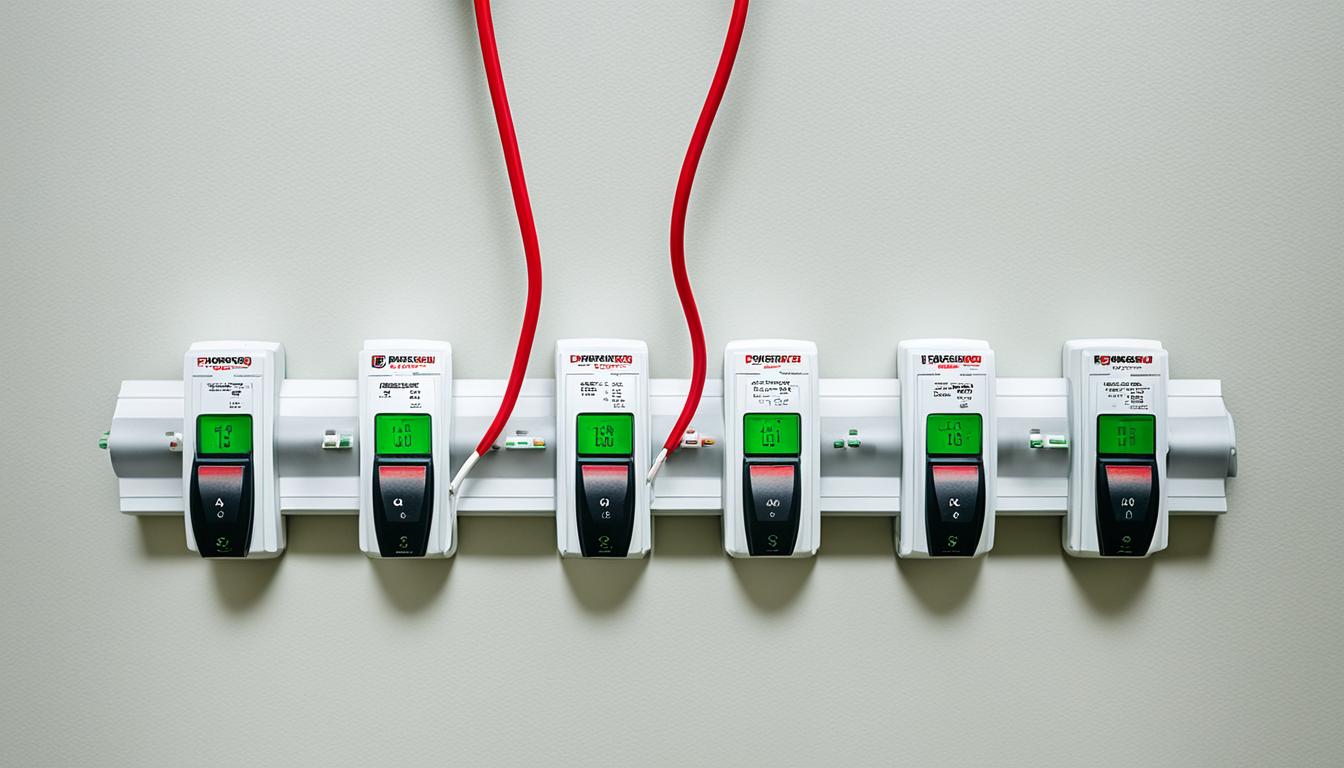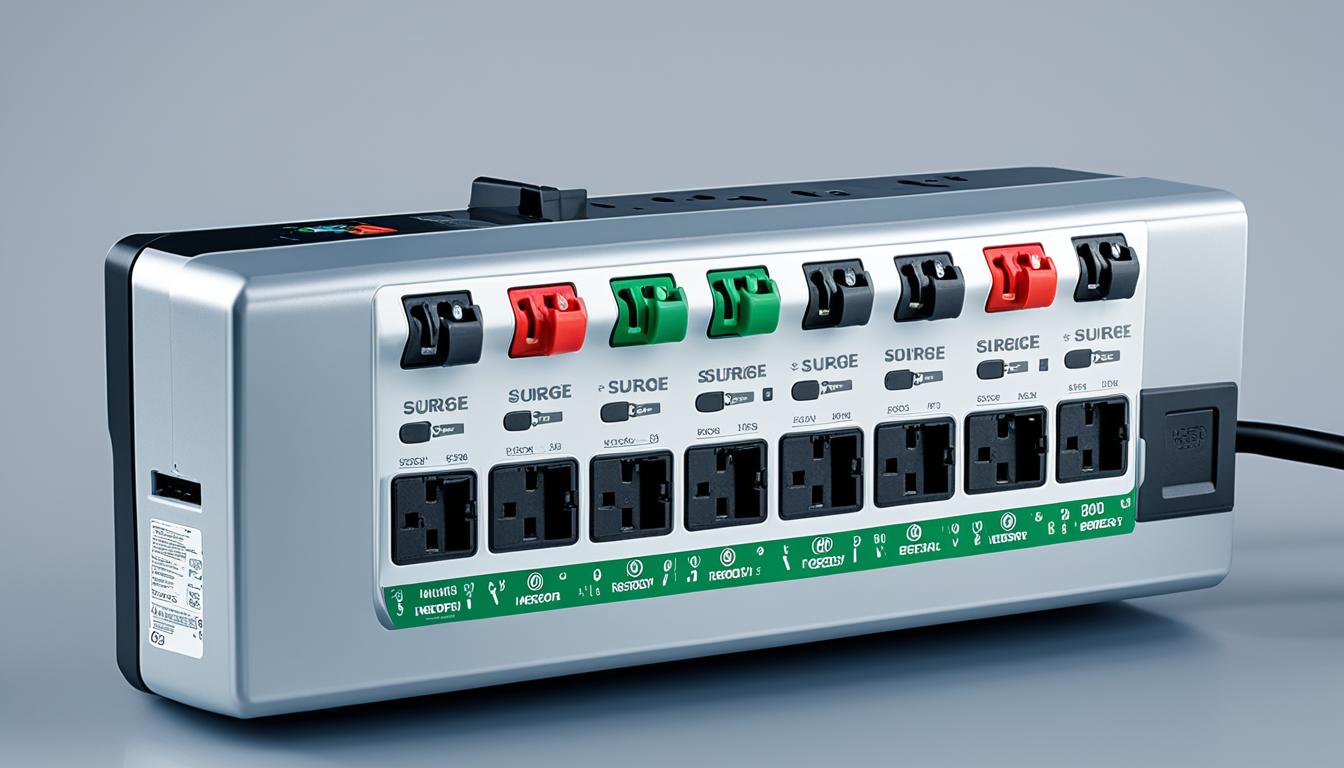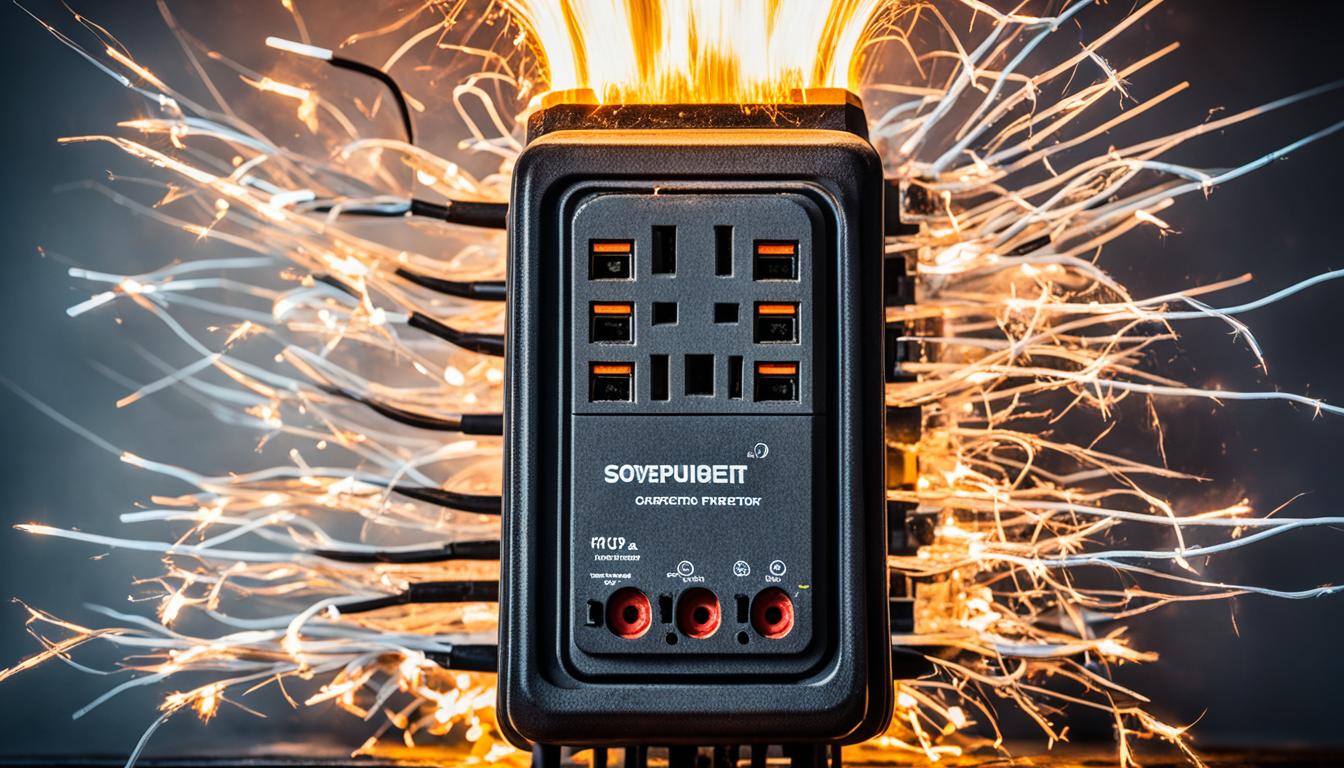Extension cords are a convenient and practical solution for powering small appliances, yard tools, and electronics that cannot reach the nearest electrical outlet. However, it is crucial to prioritize extension cord safety to prevent potential fire hazards. Improper use of extension cords leads to more than 3,000 house fires every year, according to the Electrical Safety Foundation. In this article, we will explore electrical safety tips and guidelines for choosing the right extension cord for your needs.
Key Takeaways:
- Choose the right extension cord to ensure safe and efficient power for your appliances.
- Prioritize electrical safety to prevent fire hazards and accidents.
- Consider factors such as cord length, wire gauge, and amperage limits when selecting an extension cord.
- Familiarize yourself with extension cord designations to pick the appropriate cord for specific tasks.
- Follow important dos and don’ts of using extension cords to prevent accidents and ensure optimal safety.
How to Choose the Right Extension Cord
When it comes to selecting an extension cord, there are several factors to consider to ensure it is the right choice for your specific needs.
Cord Length
The length of the extension cord is a crucial factor to consider. Longer cords tend to have higher electrical resistance, which means they deliver less power to your devices. It is important to choose a cord with an appropriate length that allows you to reach the nearest electrical outlet without excessive slack.
Wire Gauge
The wire gauge of the cord determines its capacity to handle electrical current. Lower gauge cords have a higher capacity, making them suitable for heavy-duty appliances and high-power equipment. When choosing an extension cord, consider the power requirements of the devices you plan to use with it and opt for a wire gauge that can safely accommodate the load.
Amperage Limits
It is crucial to select an extension cord with an amp rating equal to or higher than the device you intend to power. Using an extension cord with a lower amp rating can lead to overheating and may pose a fire hazard. Check the user manual or specifications of your appliances to determine their amperage requirements.
Designations
Extension cords are often labeled with designations that provide valuable information about their intended use and safety features. Look for cords with designations such as “UL certified” to ensure they meet safety standards. Additionally, consider specific designations like “heavy-duty” or “outdoor” for applications that require extra durability or weather resistance.
Remember, choosing the right extension cord is essential for the safe and efficient operation of your appliances and equipment. Taking the time to carefully consider these factors will help you make an informed decision and prevent any potential electrical hazards.
| Factor to Consider | Importance |
|---|---|
| Cord Length | Ensuring proper reach without excessive slack |
| Wire Gauge | Selecting the appropriate capacity for your devices |
| Amperage Limits | Matching the cord’s amp rating to your device |
| Designations | Choosing cords with safety certifications and specific features |
Extension Cord Designations
Extension cords are labeled with specific designations that provide information about their intended use and work areas. Understanding these designations is crucial for choosing the right extension cord for your needs and ensuring optimal safety. Here are some common extension cord designations:
Indoor Extension Cord (S)
An indoor extension cord is designated with an “S.” These cords are specifically designed for general indoor use in areas such as homes, offices, and workshops. They are not suitable for outdoor use or exposure to moisture.
Outdoor Extension Cord (W)
An outdoor extension cord is designated with a “W.” These cords are specifically designed for outdoor use and can withstand exposure to elements such as rain, snow, and sunlight. They are more durable and have additional insulation to ensure safe operation in outdoor environments.
Grounded Extension Cord
A grounded extension cord has a three-pronged plug, with two flat prongs and one round grounding pin. The grounding pin is essential for connecting the appliance or device to the earth’s electrical system, providing an extra layer of safety to prevent electrical shocks and surges.
Durable Extension Cord
When it comes to durability, it is essential to choose an extension cord that can withstand the demands of your specific tasks. Look for extension cords that are designed with high-quality materials and construction techniques, ensuring they are resistant to wear, tear, and abrasion. These cords are ideal for use in rugged environments, construction sites, or areas with heavy machinery.
Understanding these extension cord designations will help you make an informed decision when selecting the right cord for your needs. Whether you need an indoor extension cord, outdoor extension cord, grounded extension cord, or a durable extension cord, choosing the right designation ensures the safe and efficient operation of your electrical devices and appliances.
Important Dos and Don’ts of Using Extension Cords
To ensure safe and proper use of extension cords, it is essential to follow important dos and don’ts. These tips will help you maintain electrical safety while using extension cords and ensure the longevity of your cords:
Dos:
- Check the extension cord for damage before use.
- Cover unused receptacles to prevent dirt and debris from entering.
- Purchase cords labeled by an independent laboratory such as UL to ensure compliance with safety standards.
- Keep extension cords away from water and snow to avoid electrical hazards.
- Pay attention to ratings and designations to ensure the cord is suitable for your specific needs.
- Neatly roll up and store extension cords when not in use to prevent tangling and damage.
- Unplug unused cords to minimize energy consumption and reduce the risk of accidental damage.
- Ensure a secure connection by firmly inserting plugs into outlets.
- Use GFCI-protected outlets in damp or wet areas to protect against electric shock.
Don’ts:
- Use indoor extension cords outdoors as they are not designed to withstand outdoor conditions.
- Use extension cords for space heaters or high-powered appliances that exceed their amp rating.
- Overload extension cords by connecting too many devices or appliances to a single cord.
- Force extension cords into outlets as this can damage the cord and the outlet.
- Staple or nail extension cords to walls or furniture, which can damage the cord’s insulation and create a fire hazard.
- Allow extension cords to be within close proximity to children or pets, as they may chew or trip over them.
- Connect multiple cords or power strips together, as this increases the risk of overloading and electrical fires.
By following these extension cord safety tips and practicing proper electrical safety, you can ensure the safe and efficient use of extension cords in your home or workspace.
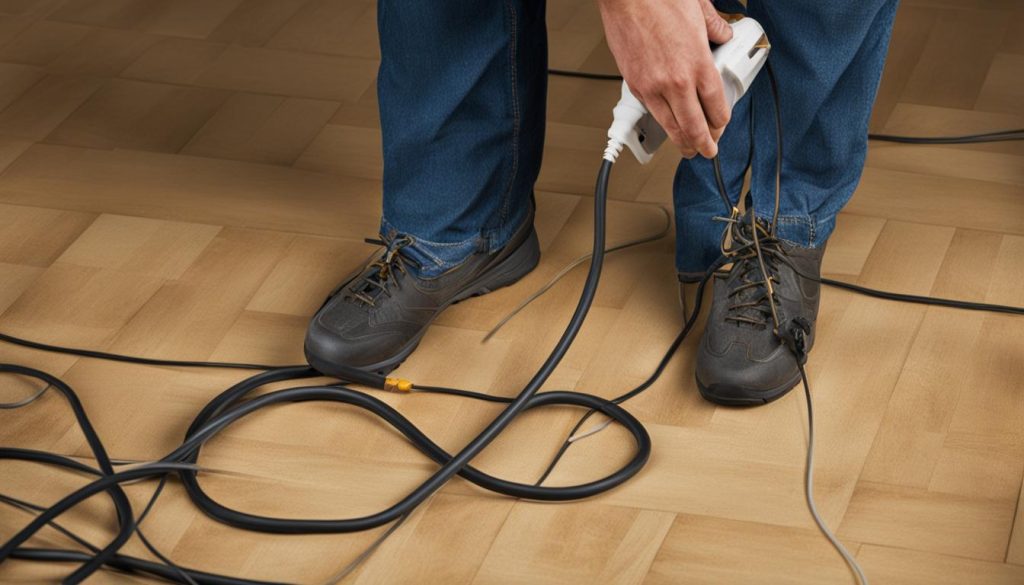
Remember, caring for extension cords plays a crucial role in maintaining their safety and longevity. Properly coiling, storing, and inspecting your extension cords regularly will help prevent damage and reduce the risk of accidents.
The Dangers of Improper Extension Cord Use
Improper use of extension cords can pose significant dangers, including the risk of fires and electrical shocks. Every year, approximately 3,300 home fires originate from extension cords, resulting in 50 fatalities and 270 injuries. Overloading extension cords, using them as permanent wiring, running them through walls or doorways, and using damaged or inadequate cords all increase the risk of accidents and electrical hazards. It is essential to prioritize electrical safety and use extension cords properly to avoid these dangers.
The Risk of Extension Cord Fire Hazards
One of the most serious risks associated with improper extension cord use is the potential for fire hazards. Overloading an extension cord by connecting too many devices or appliances can cause the cord to overheat, leading to a fire. Additionally, using extension cords as permanent wiring can result in the accumulation of heat over time, increasing the risk of a fire. Using damaged cords, such as those with frayed insulation or exposed wires, further heightens this risk.
It is vital to always follow the manufacturer’s guidelines for extension cord usage, including the maximum wattage or amperage rating. Overloading the cord by exceeding these limits significantly increases the chance of a fire breaking out. It is also important to inspect and replace damaged cords promptly to reduce the risk of electrical fires.
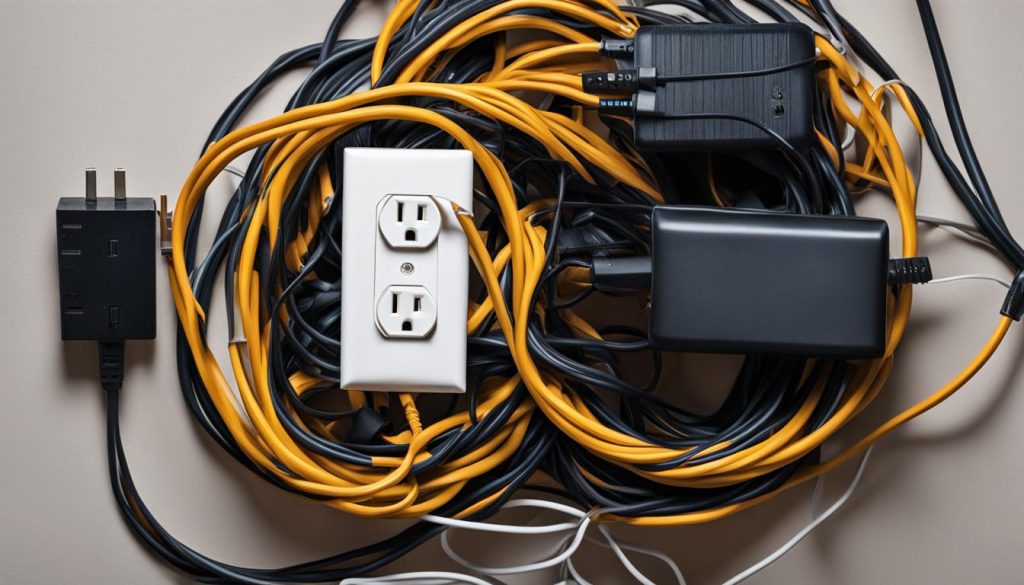
The Dangers of Electrical Shocks
In addition to fire hazards, improper use of extension cords can lead to electrical shocks. When extension cords are not properly grounded or used in wet or damp environments, the risk of electrical shock increases. Connecting multiple cords or power strips together in a chain, often referred to as “daisy-chaining,” can also result in an increased risk of electrical shock.
Electrical shocks can range from mildly uncomfortable to life-threatening, depending on the severity of the shock and the individual’s overall health. It is crucial to use extension cords that are designed for the specific environment in which they will be used, such as outdoor-rated cords for outdoor use. Additionally, always ensure that extension cords are properly grounded when necessary and avoid using damaged cords to minimize the risk of electrical shocks.
Improper use of extension cords can have severe consequences, including fires and electrical shocks. Taking the necessary precautions and following electrical safety guidelines is crucial to protect yourself and your home from these potential hazards.
Safe Extension Cord Practices to Minimize Risks
To minimize the risks associated with extension cord use, it is essential to follow safe practices:
- Choose the appropriate extension cord for the intended use, considering factors such as length, wire gauge, and amp rating.
- Inspect extension cords regularly for any signs of damage and replace them if necessary.
- Position cords away from heat sources, water, and high-traffic areas to reduce the risk of damage and accidents.
- Never force a plug into an outlet or overload an extension cord beyond its capacity.
- When not in use, unplug and store extension cords properly, avoiding tangles or knots that can cause damage.
By following these safety tips and using extension cords responsibly, you can help ensure the well-being of both yourself and your property, reducing the risk of electrical fires and shocks.
The Importance of Proper Electrical Wiring
When it comes to powering your devices and appliances, relying too heavily on extension cords may indicate a lack of sufficient electrical outlets in your home. While extension cords offer a temporary solution, it is crucial to have additional outlets installed where you need them to eliminate the need for excessive reliance on these cords. This not only enhances convenience but also prioritizes safety.
If you find yourself using extension cords on a permanent basis, it may be time to consider updating your home’s electrical system and ensuring proper wiring. Installing additional outlets throughout your home not only reduces the risk of accidents but also provides a reliable and efficient power source. By prioritizing proper electrical wiring, you can create a safe and convenient environment for all your electrical needs.
Proper electrical wiring allows you to distribute power effectively, ensuring that each room has the necessary outlets to accommodate your devices and appliances. It eliminates the inconvenience of tangled cords and minimizes the risk of tripping or accidentally pulling a cord out of the socket. Additionally, permanent wiring ensures that your electrical system meets current safety standards and regulations, giving you peace of mind.
FAQ
What is an appliance extension cord?
An appliance extension cord is a type of power cord specifically designed to provide electricity to small appliances, yard tools, and electronics that cannot reach the nearest electrical outlet. It allows you to power your devices conveniently and safely.
How do I choose the right extension cord?
When selecting an extension cord, consider factors such as cord length, wire gauge, amperage limits, and designations. Ensure the cord length suits your needs, select a lower gauge cord for higher capacity, choose a cord with an amp rating equal to or higher than your device’s requirements, and look for UL certified extension cords for safety assurance.
What are extension cord designations?
Extension cords are labeled with specific designations that indicate their intended use and work areas. Common designations include “S” for general indoor use, “W” for outdoor use, “J” for 300-volt standard insulation, “T” for vinyl thermoplastic cord jacket, “E” for thermoplastic elastomer rubber cord jacket, “P” for parallel wire construction, and “O” for oil-resistant. These designations help you choose the right cord for specific tasks and ensure safety.
What are some important dos of using extension cords?
Important dos of using extension cords include checking for damage before use, covering unused receptacles, purchasing cords labeled by an independent laboratory such as UL, keeping cords away from water and snow, paying attention to ratings and designations, neatly rolling up and storing cords when not in use, unplugging unused cords, ensuring a secure connection, and plugging cords into GFCI-protected outlets in damp or wet areas.
What are some don’ts of using extension cords?
Some don’ts of using extension cords are using indoor cords outdoors, using them for space heaters, overloading them, forcing them into outlets, stapling or nailing them, allowing close proximity to children or pets, and connecting multiple cords or power strips together. Avoiding these practices helps prevent accidents and electrical hazards.
What are the dangers of improper extension cord use?
Improper use of extension cords can pose significant dangers, including the risk of fires and electrical shocks. Approximately 3,300 home fires originate from extension cords each year, resulting in fatalities, injuries, and property damage. It is crucial to follow safety guidelines to prevent these hazards.
Why is proper electrical wiring important?
Proper electrical wiring is essential for safety and convenience. Relying heavily on extension cords may indicate a lack of sufficient electrical outlets in your home. Having additional outlets installed where you need them eliminates excessive reliance on extension cords and reduces the risk of accidents and electrical hazards.
